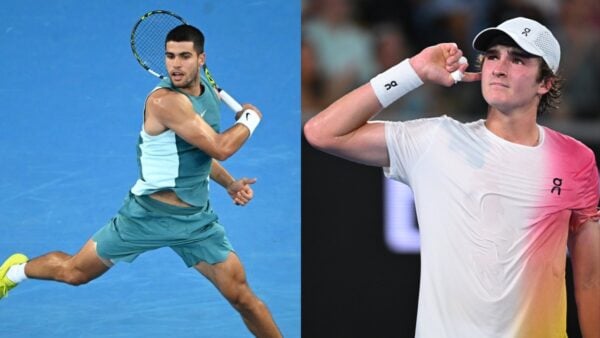Virat Kohli is the most successful Indian captain – really Ravi Shastri?

Virat Kohli and Ravi Shastri
🔍 Explore this post with:
“Virat Kohli now, compared to 2014, he is slimmer first of all. He is fitter. He’s captain of the side and India’s most successful captain, and he’s only 5,500 thousand runs richer”, bellowed Ravi Shastri in his typically boisterous baritone. The question was directed at the captain. The coach, however, excitedly interjected to provide four facts and one opinion.
Now, Ravi Shastri is not your everyday Indian. He is hardly one from the bottle. If he were a football coach, he would probably be Jose Mourinho’s best friend and his perfect replacement in press conference rooms. Shastri is flamboyant, unabashed and remains undeterred in freely expressing what his heart crudely feels. That is how he has lived his life as a cricketer and that is exactly how he continues to live life, even as coach. He is cricket’s version of the Special One.
And special he very well is. Not least in the Indian cricketing fraternity of today. In fact, he is one of only two men in Indian cricket who can be deemed as truly untouchable. The other one is, of course, captain Kohli himself – Shastri’s most public patron. And an ardent one indeed.
Kohli and public fancy for Shastri

Kohli has, it is well chronicled, gone out of his way to keep Shastri close to him as the Indian coach. Over the years, he was lobbied for him in various ways – participated in a coach being replaced and announced before the selection of another his fancy for Shastri’s continuation.
In the first instance, the result was an embarrassing and entirely avoidable episode that played out in public as if the watching world were an audience in a Broadway play. The only problem was that it was the cringy kind that saw a very sad end to the Indian coaching stint of perhaps the country’s greatest ever match winner in the Test format – Anil Kumble.
This had a domino effect on multiple fronts with plenty of senior retired cricketers left feeling disrespected. This list comprises players who were once considered members of the “Fab Four”.
In the second instance, proceeding was more subtle. If it were a Broadway play, the list of takers for the part of protagonist was suggestively trimmed ahead of applicants submitting their decorated resumes. When a captain announces that he would be “very happy” for the current coach to continue ahead of the Board inviting applications from potential candidates, it is a soft signal to those applying. And whatever one’s general disposition might be towards soft signals, it is a yet unavoidable reality in cricket.
Should captains have a say in the matters of selecting a coach? Most definitely. It is he who will work with him. The real question, however, is – should a captain influence the process of selection of a coach? It is a rhetoric really.

Eventually, sport – like most other disciplines – is a function of meritocracy, and the best available person should be picked for vacant spots. And just like other disciplines, the process of evaluating the best possible candidate for a particular position – however obsolete – should be respected and followed, till a better alternative is conceptualized.
It can be safely concluded, on both aforementioned occasions, the process became a mere formality. Imagine conducting entrances for a university, selecting a candidate and after a few days of lectures, informing him a better alternative has been sought and found. Or perhaps, announcing ahead of the entrance itself that the candidates to occupy designated seats have already been identified.
But, of course, sport is a completely different ball game, and it hardly follows the semantics of everyday life. It is unlike any other profession. Here, people spend months together – more time with the men they work with than wives and children and family. It is imperative that two men – working as closely as captain and coach – find alignment in operative principle.
Shastri’s return of public appreciation to Kohli

Thus, it should be hardly surprising that coach Shastri would zealously return captain Kohli the favour of public advocacy.
“I cannot see Virat’s feat of winning against Australia both at home and away being emulated by another Indian captain,” Shastri had said after Kohli led India to an unprecedented victory on Australian soil in the 2018/19 series that saw David Warner and Steve Smith sit out due to a suspension.
India won again in Australia earlier this year. This time Australia had a full-strength team, and it was India that kept losing its soldiers, one after another. They lost the first Test, crumbling to their lowest ever score in the second innings. However, under Ajinkya Rahane’s leadership, the team pulled off the greatest modern-day heist – and perhaps even in the history of cricket – to take India to a 2-1 victory at Gabba.

This time, Shastri, in his press conference – among other things – said, “You must give credit to Virat. He may not be here but his character, his personality and stamp is there for everyone to see”. He also heaped praised on skipper Rahane and the team’s spirit, which must be said, is an embodiment of the coach himself. Shastri’s fiery character and guts in the face of adversity was well symbolized in India’s efforts. And so was Rahane’s understated steely resolve.
However, that exteriorization did not find as vehement support or validation. When asked about the victory in 2019, Shastri had said, “I will tell you how satisfying it is for me. World Cup 1983, World Championship of Cricket 1985 – this is as big, or even bigger.” No such comment was reserved for the 2020/21 tour. Perhaps the wider world would agree that the recent victory is the bigger achievement. Not solely against the 2018/19 but any ever achieved by any Indian team. The closer triumph – for the sake of conversation – would be the one at home in 2001.

Shastri overselling Kohli’s achievements, thus, has precedence and is very commonplace. However, on every previous occasion, there was a prompt or a suggestion of the team not doing as well as they openly promised to. “India’s best travelling team in last 15 years” and “can’t see any other Indian team in the last 15-20 years that has had the same run” et al.
This time, however, the question posed was thus – what is the difference in headspace of Virat Kohli from 2014 to 2021? No trigger, no prompt or suggestion of defying establishment. The opinion from the coach, thus, feels unasked for and unprompted. Perhaps even strange and unnecessarily arrogant.
The consequence of opinion from influential people
Eventually one can never fault a man for expressing his opinion. However, more discretion is expected from the representative of an official organization. After all, Shastri is the coach of the Indian cricket team, not Virat Kohli’s Indian cricket team. There is a major difference between the two. Shastri, being as closely intertwined with Indian cricket in various capacities should be well aware of the larger impact of making such sweeping statements.
Opinions from influential people are important – much more important than those by people with lower reach, given the very magnitude of its spread. Even between the various kinds of influential voices, lies a difference. When the public consumes content from a commentator or from independent sources, they are acutely aware of the very nature of the content being subjective.
However, statements made by representatives of a governing body are not. Or at least, they are not meant to be. Which is why the nature of it, in delivery and consumption, are very different. They are not opinions, but carefully crafted objectivity. That explains why players avoid certain questions from journalists. It also explains the intrigue behind interviews categorized as “unfiltered”.
When the audience watches an episode of Chahal TV, immediately the mind is aware of the essence of that content – it is fun and subjective. People must view it in that light. But official press conferences are not. They are supposed to be objective. For example, when BCCI announces 15 members, we know those will be the players officially in the squad. But when Harsha Bhogle does the same on YouTube, we know it his subjectivity and his opinion.

So, should Shastri’s statement about Kohli being India’s most successful captain be taken as the objective stance of BCCI? Of course not. And herein lies the issue. He is not a commentator anymore. Perhaps, instinctively he is. Or perhaps, he is a terrific reader of the room and is merely playing his part in sending his captain – and the team’s best batsman – in the best frame of mind to England.
One can never fault Shastri for lack of motivating gusto. On his watch, the Indian team has indeed transformed into a truly all conditions team. Today, there remains hardly any frontier where India head into on the backfoot. And Shastri deserves credit for his role in positioning Virat Kohli’s India into an undisputed performing powerhouse.
But, in his honest endeavour, Shastri would have raged a debate or at least, pique a thought. If he had chosen his words a little more carefully and added the word “statistically”, we would not be here. It would then have been a fact – which is either correct or incorrect. Not an opinion – which, given its very nature, rages further opinion and debate. Careful, however, is not Shastri’s modus operandi.
Legacy of captains – Kohli, Dhoni and Ganguly

And so, two former captains from the eastern side of India immediately springs to mind. Between the two, one is clearly the better Test match leader and the other a more prosperous limited overs captain. Sourav Ganguly and MS Dhoni, respectively. This also provides a pre-mature chance at evaluating Kohli’s reign as skipper.
Now, there are various barometers to judge captains. For one, there is statistics; and solely numbers will signal a clear winner – Virat Kohli. Shastri would be correct and there would be no debate. But there is a glaring fallacy in the very nature of numbers. It misses context. For example, Rashid Khan’s numbers in Test cricket is beyond extraordinary. Most of these wickets, though, have been achieved against associate nations and in the one Test match against India, he seemed completely lost.
So, simply looking at numbers would be naive. Just numbers will tell you India won the same number of matches in the 2011 and 2019 ICC World Cups. Barely reveals anything. On the contrary, hides every important detail. For the uninitiated, India won the 2011 World Cup under Dhoni and fell in the semi-final of the 2019 event under Kohli, in their first knock-out game.

Hence, numbers must be contextualized with landmark events. Dhoni, in this case, is well ahead of competition in the ODI format. He is the only captain to have won all three ICC events – T20 World Cup, 50-over World Cup and the Champions Trophy. Kohli is yet to win an ICC event as a senior captain. He might well change that by claiming the ICC World Test Championship. Kohli, however, has won away at Australia, West Indies and Sri Lanka.
The cricketing credential of the latter two nations at the times of Kohli’s victories is for the viewer to judge. A good way to go about it would be to ask – how many players from the current team would get into the team from another era?
Ganguly, meanwhile, had won the Champions Trophy, an away series in Pakistan, the Natwest Trophy in England and a home series against perhaps the greatest modern-day cricket team – Australia of the time. He came close but was stopped by the same Australians in the World Cup final of 2003.

This also brings to the fore the context of time. One cannot simply overlook the era in which the captains played. It would be akin to comparing leaders of a nation based crudely on GDP without factoring in when they held post. For example, declaring George W. Bush a better leader than Abraham Lincoln.
That is precisely why Ganguly will always hold unquantifiable weight in any captaincy debate. He brought about an unprecedented change in the culture of Indian cricket. Those who debuted under him and were backed by him, still talk about his unparalleled contribution in changing the mentality of cricketers. Even those already established when Ganguly took over glorify his leadership and see it as the turning point of Indian cricket en route to the behemoth it is today.
Captaincy, or leadership, should unquestionably also be about legacy. It cannot revolve solely around victories and defeats. And so, one must always ask, while judging a captain – what is his legacy? For Ganguly, it is the changing of culture and forging a winning mentality. For Dhoni, it is the three ICC trophies and a template of winning games. For Kohli, perhaps the end of his tenure would be a fairer time for judgement.
Recollection should not be too difficult. Shastri will – through time – find creative ways to remind the world of his captain’s various exploits.







